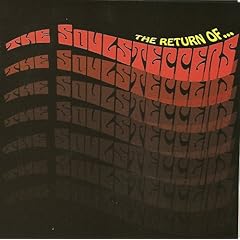 Jump Up! Records
Jump Up! Records2008
Ever since 2 Tone was tagged as a "ska revival" movement in the late 70s, each subsequent wave of ska has been burdened with this albatross around its neck. While it probably didn't help that so many of the 2 Tone acts expressed their sincere love of their influences so prominently in their set lists and on their LPs, people like Jerry Dammers, Mike Barson, and Dave Wakeling heard Prince Buster, Laurel Aitken, and many more extraordinary JA musicians as they grew up along side the sons and daughters of Jamaican immigrants. Ska and reggae had become an integral part of the empire of British pop culture, as England absorbed the music and styles of the peoples of its former colonies--so questions of legitimacy or cultural appropriation were never an issue (particularly when many of the 2 Tone bands were multi-racial and The Beat could boast of Saxa in their ranks).
Respect was due to the originators, even as their songs were being transformed by the fury of the times and the power of punk. Yet an over-reliance on (admittedly brilliant) ska covers on all of their debut LPs--which helped launch the bands to the Top of the Pops--left the 2 Tone bands open to accusations of creative shortcoming in the songwriting department (something that certainly was not an issue on follow-up albums by The Specials, The Beat, and Madness). So, yes, 2 Tone may have started out as as a ska revival, but a lot of distance was covered from "A Message to You, Rudy" to "Ghost Town"--and at by end, the sound and style was all their own.
But this informed and nuanced view of 2 Tone never made it across the Atlantic whole. Most mainstream music critics in the US have been all too willing to sneeringly dismiss the scene as somehow illegitimate--failing to see that 2 Tone, the third wave of the late 80s and 90s, and whatever we want to call what is going on today as the organic evolution of this genre of music, developing in new ways as it is re-interpreted by successive generations of musicians around the world. Interestingly enough, the questions of musical authenticity or musical/cultural appropriation generally don't dog rock bands using/exploring/recycling blues riffs or punk bands doing the Class of '77 ad nauseum. But ska is shunted off to its own musical ghetto--and maybe its better this way. Most people don't know what to do with it.
Perhaps because those in the current ska scene are somewhat touchy about questions of ska's lineage (though their affection and respect are never in doubt), many traditional bands are almost fanatical about authentically re-creating the particular style of Jamaican music they love. While I'm generally more intrigued by acts which bring something new to a specific musical form, the groups with the talent and skills to faithfully realize a specific vintage ska sound and compose new songs in that style--without succumbing to shoddy imitation or parody--are really worth hearing.
A fairly recent album by a band in this category (that seemed to slip under the radar) is Return of the Soulsteppers by Bakersfield, California's The Soulsteppers, who are remarkably similar in sound and quality to the cream of the skinhead reggae crop: The Upsetters, Laurel Aitken, Harry J All Stars, Dave Barker & Ansell Collins, Clancy Eccles, Lloyd Charmers, Symarip, and The Pioneers, among others. After first listening to The Return of the Soulsteppers, I was also reminded of the two King Hammond records that Bad Manners' Nicky Welsh lovingly created (if, at times, a bit tongue in cheek), Revolution 70 and Blow Your Mind, in the late 80s/early 90s (the story goes that when the debut King Hammond album was released, they actually passed some of them off to unsuspecting record store owners as a long-lost skinhead reggae classic--it's that good). Indeed, The Soulsteppers are in good company.
While this mostly instrumental album is simply excellent from start to finish, highlights include (and note the extraordinary attention to detail in the production of the album--the instruments used, the recording process--it sounds like a 60s-era gem) "Warhead," with its choppy, propulsive Hammond organ and human-made groans and roars; the bass-heavy, orgasmic (le petit mort?) "Death Comes"; the ethereal flute melody floating through "Soul Step"; the soulfully sung love song "The Feeling is Real"; the jaunty "On That Evening"; "Last Laugh's" lazy, dubby trombone line contrasting with its frenetic guitar and melodica; the amazing steel drums featured in "Basson"; "Mars Invasion's" updating of "Skinhead Moonstomp"--"Cause they've already gone to the Moon/So the skinheads are going to Mars"; the sweet, romantic-sounding sax of "The Park"; and the electric piano melody leading the rhythm section forward on a march through "Death Valley"--with a reverb-y sound effect that's the aural equivalent of the sun baking your brain in your skull. Cool stuff!
The album's sparse liner notes indicate that the tunes here were composed between 2002-2008 (and several tracks were previously released on 7" singles on the European Lava and Conquering Ruler labels) and from what is captured on The Return of the Soulsteppers, it was clearly worth the wait! The rest of the world might not know what to make of The Soulsteppers--or skinhead reggae, for that matter--but if you're in the know, you'll definitely want this record.
The Duff Guide to Ska grade: A









No comments:
Post a Comment